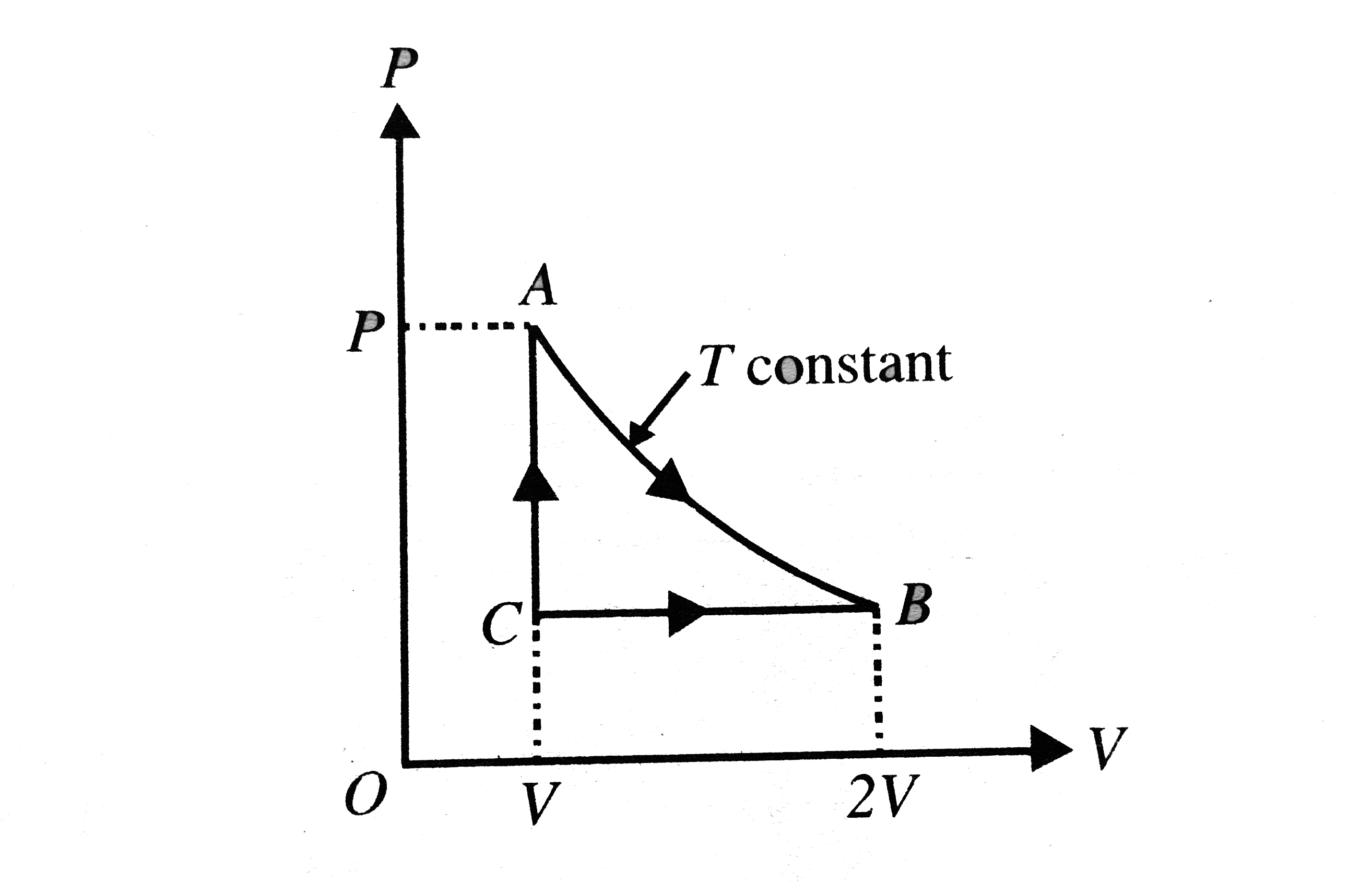If a gas expands at constant temperature
the pressure decreases
the kinetic energy of the molecules remains the same
the K.E. of the molecules decrease
the number of molecules of the gas increase
The correct Answer is:a,b
To solve the problem of a gas expanding at constant temperature, we can follow these steps:
1. Understanding the Ideal Gas Law:
The ideal gas law is given by the equation:
PV=nRT
where P is pressure, V is volume, n is the number of moles of gas, R is the universal gas constant, and T is the absolute temperature.
2. Identifying Constant Parameters:
In this scenario, the temperature T is constant, which implies that nRT is also constant since n (number of moles) and R (gas constant) do not change.
3. Analyzing the Relationship Between Pressure and Volume:
Since nRT is constant, we can express the relationship between pressure and volume as:
PV=constant
This means that if the volume V increases, the pressure P must decrease to keep the product PV constant.
4. Understanding Kinetic Energy:
The kinetic energy of gas molecules is given by:
KE=32nRT
Since the temperature T is constant, the kinetic energy of the gas molecules remains constant throughout the expansion.
5. Conclusion:
Therefore, when a gas expands at constant temperature, its pressure decreases while the kinetic energy of the gas molecules remains unchanged.
Final Statements:
- As the volume increases, the pressure decreases (Boyle's Law).
- The kinetic energy of the gas molecules remains constant since the temperature is constant.
---
The ideal gas law is given by the equation:
PV=nRT
where P is pressure, V is volume, n is the number of moles of gas, R is the universal gas constant, and T is the absolute temperature.
In this scenario, the temperature T is constant, which implies that nRT is also constant since n (number of moles) and R (gas constant) do not change.
Since nRT is constant, we can express the relationship between pressure and volume as:
PV=constant
This means that if the volume V increases, the pressure P must decrease to keep the product PV constant.
The kinetic energy of gas molecules is given by:
KE=32nRT
Since the temperature T is constant, the kinetic energy of the gas molecules remains constant throughout the expansion.
Therefore, when a gas expands at constant temperature, its pressure decreases while the kinetic energy of the gas molecules remains unchanged.
- As the volume increases, the pressure decreases (Boyle's Law).
- The kinetic energy of the gas molecules remains constant since the temperature is constant.
Topper's Solved these Questions
- GASEOUS STATEBook:NARENDRA AWASTHI ENGLISHChapter:GASEOUS STATEExercise:Match the Column
Explore 7 Videos
- GASEOUS STATEBook:NARENDRA AWASTHI ENGLISHChapter:GASEOUS STATEExercise:Assertion-ReasonType Questions
Explore 16 Videos
- GASEOUS STATEBook:NARENDRA AWASTHI ENGLISHChapter:GASEOUS STATEExercise:Level 3 Passage 3
Explore 4 Videos
- ELECTROCHEMISTRYBook:NARENDRA AWASTHI ENGLISHChapter:ELECTROCHEMISTRYExercise:Subjective problems
Explore 14 Videos
- IONIC EEQUILIBRIUMBook:NARENDRA AWASTHI ENGLISHChapter:IONIC EEQUILIBRIUMExercise:Subjective problems
Explore 1 Video
Similar Questions
When a gas expands at constant temperature, why does the pressure decrease? Explanin it on the basis of kinetic theory of gases.
View SolutionOne mole of a gas is carried through the cycle shown in Fig. The gas expands at constant temperature T from volume V to 2V. It is them compressed to the initial volume at constant pressure and is finally brought back to its original state by heating at constant volume. Calculate the work done by the gas in complete cycle.

View SolutionA certain amount of water of mass m, at a temperature T2 cools.to temperature T1. The heat given out by the water is absorbed by n mole of an ideal gas. The gas expands at constant temperature T and changes its volume from Vi to Vf What is its initial volume ?
View SolutionIf a gas is allow to expand at constant temperature,
View SolutionTwo moles of a gas at 8.21 bar and 300 K are expanded at constant temperature up to 2.73 bar against a constant pressure of 1 bar. How much work (in Latm) is done by the gas?
(neglect the sign)
View SolutionIf a gas is allowed to expand at constant temperature, then :
View SolutionIf a gas, at constant temperature and pressure expands, then its
View SolutionA gas is allowed to expand at constant temperature from a volume of 1.0L to 10.0L against an external pressure of 0.50 atm. If the gas absorbs 250J of heat from the surroundings, what are the values of q and ΔE ? (Given 1Latm=101J)
View SolutionThe bulk modulus of an ideal gas at constant temperature
View SolutionThere is no change in internal energy for an ideal gas at constant temperature.
Internal energy of an ideal gas is a function of temperature only.
View Solution

